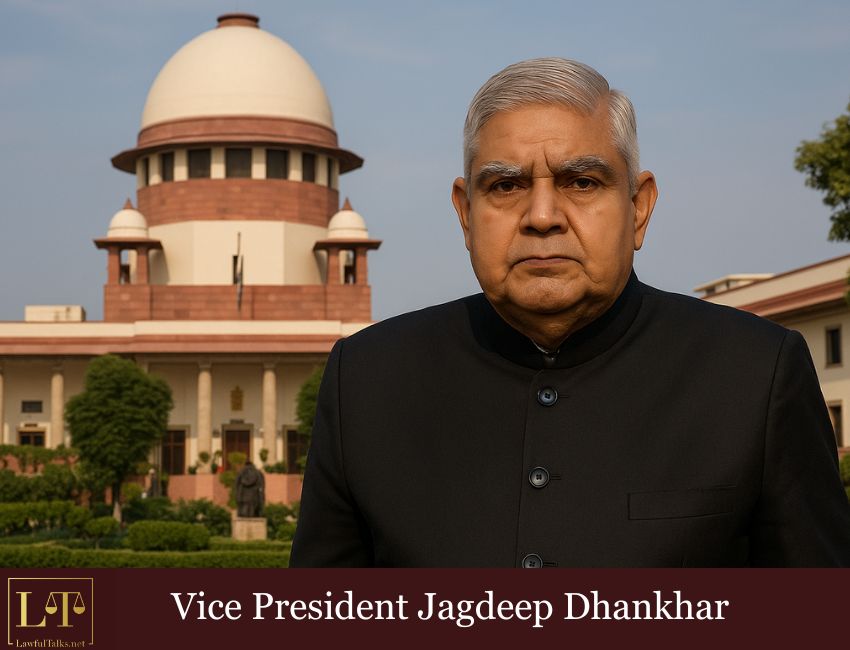Allahabad HC Sets Aside Afzal Ansari's Conviction, Allows Him to Continue as MP

In a recent address to the 6th batch of Rajya Sabha interns, Vice President of India, Jagdeep Dhankhar, strongly criticized a Supreme Court judgment that emphasized the need for the President of India to act within a reasonable timeframe when deciding on Bills referred by State Governors. The judgment in question arose from a case concerning the Tamil Nadu Governor's delay in granting assent to several Bills passed by the State Assembly.

The Supreme Court’s verdict directed that both Governors and the President must act within a reasonable timeframe under Article 200 and Article 201 of the Constitution, respectively. The Court held that undue delays in the assent process undermine federal principles and the democratic mandate of elected legislatures. It ruled that if the President fails to decide on a Bill within a prescribed period, States can approach the judiciary to seek a writ of mandamus compelling action. Furthermore, if a Bill is referred to the President by a Governor on grounds of unconstitutionality, the President must seek the opinion of the Supreme Court under Article 143 before taking a final call.
The Supreme Court’s verdict directed that both Governors and the President must act without undue delay under Article 200 and Article 201 of the Constitution, respectively. The Court held that excessive delays in the assent process undermine federal principles and the democratic mandate of elected legislatures. It further ruled that if the President fails to take a decision within a reasonable period, States may approach the judiciary seeking a writ of mandamus compelling action. Moreover, if a Bill is referred to the President by a Governor on grounds of unconstitutionality, the President ought to seek the opinion of the Supreme Court under Article 143 before taking a final decision.
This judgment was delivered by a two-judge bench of the Supreme Court, prompting sharp criticism from the Vice President. He contended that, under Article 145(3) of the Constitution, any matter involving substantial constitutional interpretation must be decided by a Constitution Bench comprising at least five judges. He pointed out that this requirement was instituted when the Supreme Court had only eight judges and argued that, given the current strength of 31 judges, Article 145(3) should be amended to mandate a higher quorum for such significant matters.
“We cannot have a situation where you direct the President of India and on what basis? The only right you have under the Constitution is to interpret the Constitution under Article 145(3). There, it has to be five judges or more... Article 142, Article 142 has become a nuclear missile against Democratic forces, available to judiciary 24 x 7,” he added.
He further expressed concern that the judiciary, through this ruling, had assumed the powers of the executive and legislature, stating, “We never bargained for democracy for this day. President being called upon to decide in a time-bound manner, and if not, becomes law. So we have judges who will legislate, who will perform executive functions, who will act as super-parliament, and absolutely have no accountability because law of the land does not apply to them.”
The Vice President also raised concerns about judicial accountability, referencing the recent controversy involving the recovery of cash from the residence of Justice Yashwant Varma. “An event happened on the night of 14th and 15th of March in New Delhi, at the residence of a judge. For seven days, no one knew about it. We have to ask questions to ourselves. Is the delay explainable? Condonable? Does it not raise certain fundamental questions? In any ordinary situation, and ordinary situations define rule of law – things would have been different. It was only on 21st March, disclosed by a newspaper, that people of the country were shocked as never before.”
He added, “Thereafter, fortunately, in public domain, we had input from authoritative source, the Supreme Court of India. And the input indicated culpability. Input did not lead to doubt that something was amiss. Something required to be investigated. Now the nation waits with bated breath. The nation is restive because one of our institutions, to which people have looked up always with highest respect and deference, was put in the dock.”
He questioned why no FIR had been registered in the matter and why the inquiry being conducted by a judges’ panel had not been made public. He also expressed discomfort over the judiciary assuming investigative roles, and flagged the fact that many judges have still not declared their assets—an issue that continues to fuel concerns over transparency and accountability in the judicial system.
Source: News

Pallavi Zende
Law Student
Latest Posts
Categories
- International News 19 Posts
- Supreme Court 352 Posts
- High Courts 366 Posts




























































































































































































































































































































































































































































































































































































































































































































































